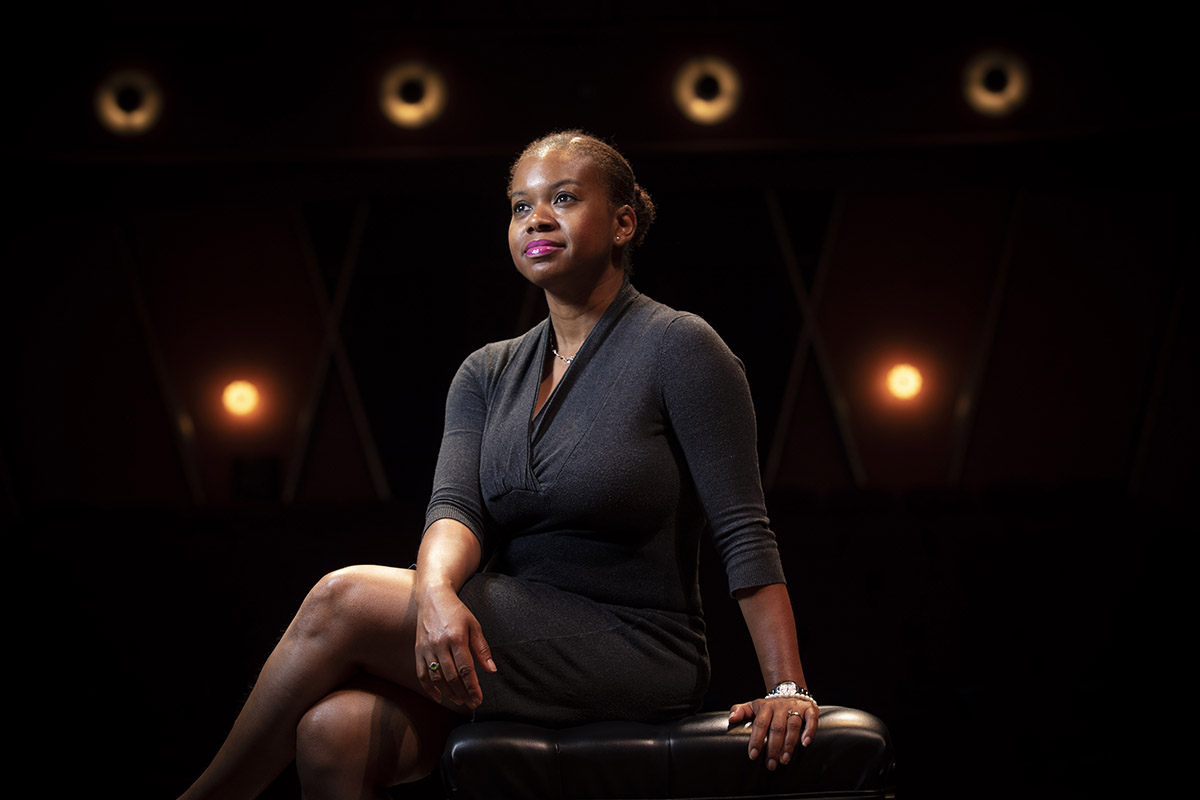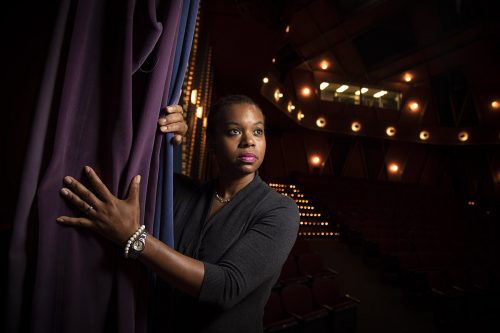Black Theater and Literature Show America’s Painful Past
Stacie McCormick, assistant professor of English, explores the link between slavery and contemporary African American performance and literature.

In her book, Staging Black Fugitivity, Stacie McCormick bridges literature about slavery with theater productions on the same subject. Photo by Joyce Marshall
Black Theater and Literature Show America’s Painful Past
Stacie McCormick, assistant professor of English, explores the link between slavery and contemporary African American performance and literature.
Robbie McCauley stood naked atop a makeshift auction block on a darkened stage while the other actor in her two-person play assumed the role of auctioneer, compelling audience members to shout, “Bid ’em in.”
Over the clamor, McCauley, an actor and playwright who won an Obie Award for Best New American Play in 1992 for Sally’s Rape, tells the story of her great-great-grandmother, a slave named Sally who endured years of sexual abuse.
Indelible scenes such as this spurred Stacie McCormick to ponder how theatrical depictions of slavery and violence relate to contemporary African American experiences. Her book, Staging Black Fugitivity, published by Ohio State University Press in September 2019, grapples with neo-slave drama and what it means in the 21st century.
“A lot of what I was coming across in black women’s writing dealt with trying to elevate these stories of pain that have not been represented in the historical archive.”
Stacie McCormick
In the book, the assistant professor of English examines theatrical adaptations of several seminal African American novels, many of which concern slavery or its resulting societal scars.
“As each generation encounters these writers who have been so foundational to African American literature, I think there is this need to engage with them in a way that feels right for the moment,” McCormick said. Theater seems an ideal medium, she said, for wrestling with complex issues and asking tough questions in a visceral way.
McCormick included Nobel laureate Toni Morrison’s debut novel, The Bluest Eye (Holt, Rinehart and Winston, 1970), which was adapted as a play in 2006. The narrative centers on a black girl who is raped by her father and must endure the effects of societal racism.
Morrison also penned the libretto for Margaret Garner, a 2005 opera about a fugitive slave whose story was the foundation of her Pulitzer Prize-winning novel, Beloved (Knopf, 1987).

Stacie McCormick hopes to shed light on what books can’t show: How the institution of slavery affected the physical bodies of its victims. Photo by Joyce Marshall
“A lot of what I was coming across in black women’s writing dealt with trying to elevate these stories of pain that have not been represented in the historical archive,” McCormick said.
In the research process, McCormick kept returning to a central question about the current cultural climate: “What is so important about slavery in this moment that gives us a sense of urgency to bring slavery into our contemporary conversations?”
McCormick spent four years — including summer 2015 at Emory University’s Stuart A. Rose Manuscript, Archives and Rare Book Library — immersed in scripts and the corresponding literature to answer her question.
What she determined was that staged work often crystallizes “a response to feelings of civic alienation that many black subjects were experiencing in the contemporary moment.”
Events ranging from the Rodney King beating in 1991 to Hurricane Katrina in 2005 to the historic election of Barack Obama as president in 2008 left many people wondering where Americans are in terms of a national conversation about race. For African Americans, that conversation inevitably begins with slavery, McCormick said.
“One of the things that I found interesting was how these writers were going back to histories of slavery in order to draw connective lines to the way their contemporary protagonists were experiencing these forms of pain in the present,” she said. “Across those texts, they’re returning to slavery in a way that shows how these histories continue to impact our present.”
“The way we understand history’s rape and socially sanctioned violence — and how that converges on black women’s bodies — that’s a conversation we need to have because that has meaning for today.”
Stacie McCormick
McCormick said she also sees onstage violence as a tool to push audiences out of their comfort zones. “The way we understand history’s rape and socially sanctioned violence — and how that converges on black women’s bodies — that’s a conversation we need to have because that has meaning for today.”
The plays McCormick discusses in Staging Black Fugitivity “explore and expose a rich and complex narrative of black experience that, unfortunately, speaks to so much about what is going on today,” said Ana Jimenez-Moreno, McCormick’s editor at Ohio State University Press.
“The news continues to show us imprisoned, tortured and conflicted black people. At the same time, there is great intellectual work performed by black artists to understand how to combat oppression but also to find productive and safe spaces for their art and for living,” Jimenez-Moreno said.
“Stacie’s book is genuinely groundbreaking,” said Joddy Murray, associate professor of English, who noted that McCormick received an AddRan faculty research award in 2018. The Woodrow Wilson National Fellowship Foundation’s Career Enhancement Fellowship, funded by the Andrew W. Mellon Foundation, also supported Staging Black Fugitivity.
“People wrestle with this history to understand how not to repeat it and how to actually create a new possibility that allows us to live out a different reality than the one we keep seeing happen over and over again,” McCormick said. “I see this work as very much continuing.”

Your comments are welcome
Comments
Related reading:
Features, Research + Discovery
Komla Aggor Traces Trans-Atlantic Slave Trade Through Language
Descendants of African slaves use the Spanish language to understand their history in Latin America.
Alumni
James Chase Sanchez’s Documentary Airs on PBS
Documentary filmmaker and alumnus wins an award for Man on Fire.
Features
‘Come From Away’ Inspiration Beverley Bass Tells Her Story
An American Airlines pilot got diverted on 9/11, and her story has landed on Broadway.